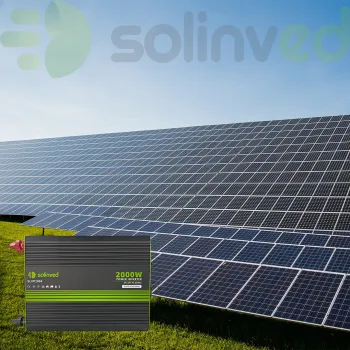


Solar inverters are one of the most critical components of solar energy systems. Inverters convert DC (direct current) energy generated from solar panels into AC (alternating current) energy, making it usable in homes, businesses, or agricultural irrigation systems. However, inverter selection directly impacts system efficiency and energy costs.
In this article, we will examine in detail the different types of solar inverters, their advantages, and which inverter is best for each situation, using Solinved solutions.
Solar inverters are generally divided into three main categories:
1. Standard (String) Inverters
Definition: They receive the energy from solar panels in a string and convert it to AC.
Advantages:
Easy to install
More cost-effective
Suitable for small and medium-sized systems
Disadvantages:
If one panel is shaded, the efficiency of the entire string decreases.
Performance optimization becomes more difficult as the system scales up.
2. Micro Inverters
Definition: A separate inverter is used for each solar panel. Energy conversion is performed on a per-panel basis.
Advantages:
Resistant to shading and panel performance issues
Energy production can be monitored on a per-panel basis
Any panel failure in the system does not affect the entire system.
Disadvantages:
Higher cost than string inverters
Installation and maintenance are more complex
3. Smart/Hybrid Inverters
Definition: Inverters that can manage AC and DC energy and integrate with energy storage systems and batteries.
Advantages:
Optimizes solar energy and battery storage
Maximizes energy efficiency
Offers remote monitoring and control features
Suitable for various applications such as agricultural irrigation, EV charging, and industrial systems
Disadvantages:
Higher cost than standard string inverters
Installation time may be slightly longer
The choice of solar inverter depends on the intended use and energy needs:
Residential Systems:
Standard string inverters are cost-effective and sufficient for small-scale residential systems.
Shady or Complex Areas:
If the risk of shading the panels on the roof or field is high, microinverters are more efficient.
Need for Energy Storage and Smart Management:
If battery storage, agricultural irrigation, or electric vehicle charging integration is required, smart/hybrid inverters are the most suitable option.
Solinved smart inverters can integrate with batteries in both AC and DC systems, providing maximum efficiency and control by offering remote monitoring.
1. Which type of inverter is best?
It depends on the application; string inverters are best suited for residential systems, micro inverters for shaded areas, hybrid/smart inverters for energy storage, or smart management.
2. Which systems are compatible with Solinved inverters?
They are fully compatible with residential, commercial, industrial, and some agricultural applications.
3. Do smart inverters increase energy efficiency?
Yes, they provide maximum energy production with MPPT and smart control features.
4. Do they require maintenance?
Solinved inverters require minimal maintenance; periodic cleaning and connection checks are sufficient.
5. Is remote monitoring possible?
Yes, smart models can be monitored via mobile and web interfaces.